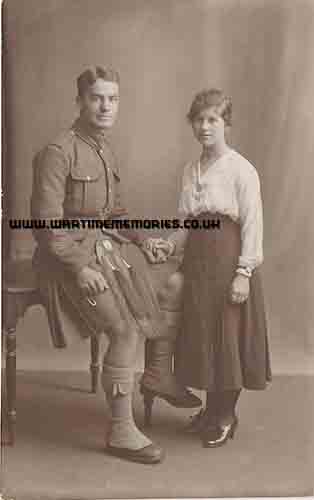Additions will be checked before being published on the website and where possible will be forwarded to the person who submitted the original entries. Your contact details will not be forwarded, but they can send a reply via this messaging system.
please scroll down to send a message
Pte. Frank Irwin Fuller
British Army 2nd/14th (London Scottish) Btn. London Regiment
Frank Irwin Fuller was born on 9th of December 1895 at Hythe Kent, the son of Ernest Fuller and Maria Isaac. His father had been a military clerk of works at Chatham; and his grandfather was in the Ordnance Survey serving in Ireland, Gibraltar, Adelaide and the New Territories of Hong Kong.
After a short period working in his uncle's furniture factory in South London, he started work as a clerk at the Anglo-American Oil Company at Queen Anne's Gate, London. He joined the 2/14th London Scottish Regiment along with a number of his work-mates on 10th of January 1916. by that time the London Scottish no longer looked for any Scottish connection in their recruits. He trained at South Veny on Salisbury Plain and specialised as a semaphore signaller. They proceeded to France on the 22nd of June 1916, landing at Le Havre. At some point in 1916 Frank was caught in a gas attack and suffered minor chest damage that affected him for the rest of his life. Nevertheless he was with his battalion in November they were sent to Macedonia. Sailing from Marseilles via Malta, they arrived in Salonika on Christmas Day 1916.
In April and May 1917 he saw action in the Battle of Doiran against the Bulgarian Army, an unsuccessful attempt to open a new front against the Ottoman Empire. In July 1917 they moved from Greece to Egypt where he was in hospital with an illness for a time. While he was there he proposed by letter to his girlfriend, Dorothy Mayell, in London, and they agreed by post that they would get married the next time he should get leave back home. Frank had some leave in Egypt to visit the Pyramids (by camel) and also made a number of water colour paintings of his surroundings.
He was involved in the Battle of Gaza and the capture of Jerusalem where he spent Christmas 1917 and made more water colour paintings. In 1918 he was involved in operations into Jordan. But in July 1918 his battalion handed over their positions to a division of the Indian Army (from whom he picked up a smattering of Hindi) before returning to the Western Front. In September 1918 he obtained leave in London. He was met by his fiance and her sister at Waterloo station and they were married before he even went home to visit his parents.
After the Armistice Frank was deployed as a guard at the Port of Dunquerque (or maybe Calais) for 3 months and learned some French from the town residents. He returned to London and was demobbed on the 13th March 1919 and rejoined the Anglo-American Oil Company. In 1927 Frank became area distribution manager for Anglo-American (now part of Esso) and the family moved to Winchester. During 1944 he had some responsibility for oil supplies to the army in advance of the invasion of Normandy and as result he was provided with a high security pass and was able to move freely through the troop assembly areas. After D-Day he continued to have some involvement in the shipment of oil supplies to France. After the war he was fuel Distribution Manager for the Channel Islands until his retirement in 1960. He died in Sussex in 1965.
